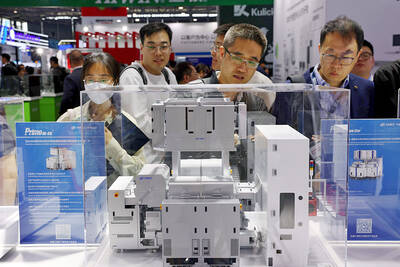General Motors Corp (GM) and DaimlerChrysler AG are considering using Taiwanese auto-parts suppliers, an official close to the matter told the Taipei Times yesterday. Such deals would mark a breakthrough for local firms in their attempts to expand into the lucrative contract-manufacturing business.
Automobile-parts giant Delphi Corp, a manufacturing arm of GM, led a delegation to Taiwan earlier this week seeking possible partnerships with local suppliers, said Hwang Wen-fang (黃文芳) of the Taiwan Transportation Vehicle Manufacturers Association (台灣區車輛工業同業公會).
The four-member Delphi delegation visited the Taipei-based association on Thursday. The Troy, Michigan-based company makes mobile electronics and transportation components and systems technology.
"We're excited about Delphi's move. It's a good opportunity for Taiwanese auto-parts makers to expand their original equipment manufacturing [OEM] business, which makes up only a small part of auto-parts suppliers' revenue," Hwang said.
Last year, Taiwanese companies exported NT$107.8 billion worth of auto parts, much of it going to retailers and auto maintenance service providers rather than automakers, he said.
Hwang said local companies could reap big profits if Delphi decided to place orders, especially as the Delphi representatives were from the company's energy and chassis division, which has the biggest procurement spending among the company's eight divisions, he said.
Air cleaners, braking systems and chassis parts are among the major items Delphi may want to buy here, Hwang said.
German-US automaker DaimlerChrysler is also set to talk to 25 local auto parts suppliers next Tuesday in Taichung. The automaker said Frank Deiss, president of DaimlerChrysler's global procurement division, will lead a delegation to Taiwan, but declined to reveal details about what items they were interested in.
Ta Yih Industrial Co (大億), Taiwan's largest headlight maker, confirmed it would have talks with DaimlerChrysler next week.
"We'll send high-ranking officials to talk to DaimlerChrysler's officials. But it is still uncertain that any purchase contract will be signed," a Ta Yih company official surnamed Chen said yesterday.
Huang said Delphi seemed quite interested in Taiwanese manufacturers and requested an extra procurement meeting.

With this year’s Semicon Taiwan trade show set to kick off on Wednesday, market attention has turned to the mass production of advanced packaging technologies and capacity expansion in Taiwan and the US. With traditional scaling reaching physical limits, heterogeneous integration and packaging technologies have emerged as key solutions. Surging demand for artificial intelligence (AI), high-performance computing (HPC) and high-bandwidth memory (HBM) chips has put technologies such as chip-on-wafer-on-substrate (CoWoS), integrated fan-out (InFO), system on integrated chips (SoIC), 3D IC and fan-out panel-level packaging (FOPLP) at the center of semiconductor innovation, making them a major focus at this year’s trade show, according

DEBUT: The trade show is to feature 17 national pavilions, a new high for the event, including from Canada, Costa Rica, Lithuania, Sweden and Vietnam for the first time The Semicon Taiwan trade show, which opens on Wednesday, is expected to see a new high in the number of exhibitors and visitors from around the world, said its organizer, SEMI, which has described the annual event as the “Olympics of the semiconductor industry.” SEMI, which represents companies in the electronics manufacturing and design supply chain, and touts the annual exhibition as the most influential semiconductor trade show in the world, said more than 1,200 enterprises from 56 countries are to showcase their innovations across more than 4,100 booths, and that the event could attract 100,000 visitors. This year’s event features 17

Germany is to establish its first-ever national pavilion at Semicon Taiwan, which starts tomorrow in Taipei, as the country looks to raise its profile and deepen semiconductor ties with Taiwan as global chip demand accelerates. Martin Mayer, a semiconductor investment expert at Germany Trade & Invest (GTAI), Germany’s international economic promotion agency, said before leaving for Taiwan that the nation is a crucial partner in developing Germany’s semiconductor ecosystem. Germany’s debut at the international semiconductor exhibition in Taipei aims to “show presence” and signal its commitment to semiconductors, while building trust with Taiwanese companies, government and industry associations, he said. “The best outcome

Semiconductor equipment billings in Taiwan are expected to double this year, as manufacturers in the industry are keen to expand production to meet strong global demand for artificial intelligence applications, according to SEMI, which represents companies in the electronics manufacturing and design supply chain. Speaking at a news conference before the opening of Semicon Taiwan trade show tomorrow, SEMI director of industry research and statistics Clark Tseng (曾瑞榆) said semiconductor equipment billings in Taiwan are expected to grow by an annual 100 percent this year, beating an earlier estimate of 70 percent growth. He said that Taiwan received a boost from a